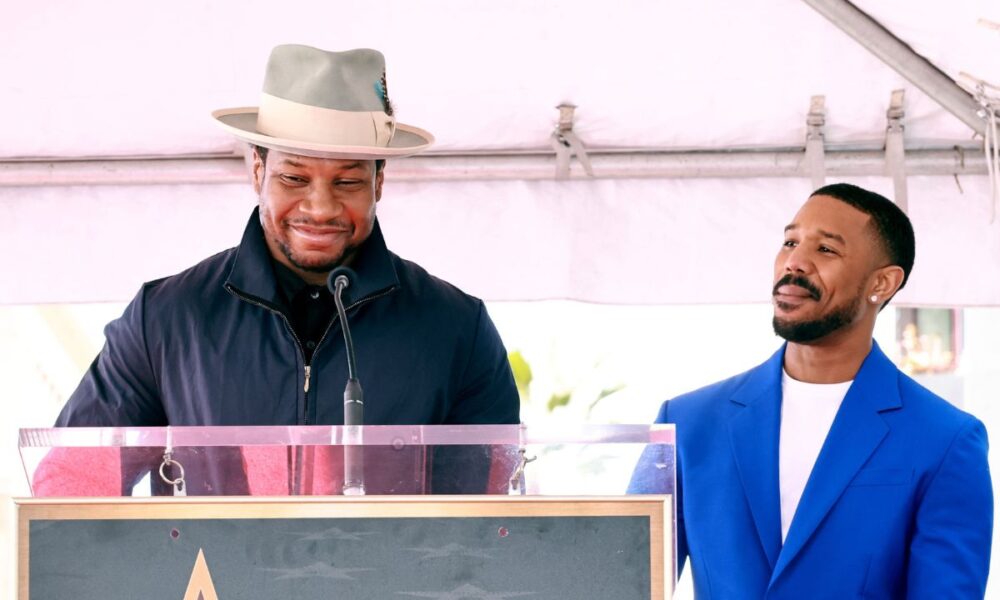In a now-viral, nine-minute introduction speech in praise of Michael B. Jordan’s star on the Hollywood Walk of Fame, actor Jonathan Majors expressed his love for his friend, Creed III co-star, and brother. Embracing one another, the pair displayed an intimacy and affection uncommon in an era that has proclaimed a decline in men’s friendships. In industries and public economies that pit and structure Black performers against others, particularly their fellow workers of colour, mutual recognition and support not only uplifts us, but wills us to change.
When you think of your friends—the drinking buddies, the hiking pals, the running bros, the Scrabble mates, the lacrosse lads, or even the trivia tyrants—you just know they have to be different than women’s friendships. You know it’s not as simple as it might seem. You might think: Even if I don’t say I love Cyrus or Donovan or Stephen, they’re always around and we’ve got a great rapport. We can and must do better than passive presence for our shared survival. Why do studies alone receive the mantle of “work hard”? How do we prevent social alienation for men and promote love, community, and growth instead? To demonstrate the advice-giving your good friend should offer, The McGill Tribune came together to rethink the possibility and potential of men’s kinship.
The Bluest Times
Friendship grows from intentional reciprocity. We play a game of give and take: You scratch my back, I scratch yours. For men who grew up told to suppress their emotions and were demanded or encouraged to turn to anger, fury, or silent discontent at the world and themselves, intention feels vulnerable. Naturalized, yet unrealistic, masculinity strips you of your ability to express yourself and articulate what you need and why you need it. Displacing care as a “feminine” action not only continuously genders existing labours, emotional and intimate, but creates a wall for any kind of relationship across the differences you leave uncritical. Thick skin doesn’t grow without original harm—to overcome it, you need an antidote.
You seek your friend out because you cannot control your own isolation and you cannot move forward alone. Your turn to self-care (even if you don’t call it that) in the things that bring you pleasure: That comfort show, that beer, that sport, shouldn’t close the door. You can bring each other up. When we struggle to share the part of us that hurts to touch, we close off the care of another. Stoicism or body-building might make you strong, but pushing past internal struggles makes you stronger collectively.
None to Accompany Me
Sure, we enter university to grasp our fantasies: Your parents’ approval, your upward mobility, your eventual autonomy. But actively committing to and working on your friendships destabilizes what we see as male individual talent. Moving beyond the self and the “fruitful” friendships of convenience, we enter into a form of unproud, radical dependence. Are you weaker because you communicate clearly? Are you less of a man because you ask for help when you need it? Consider whether friends who judge you on your manliness or weakness should be the ones you keep.
Friendship suffers when we treat it as an alliance. You’ve sold out a connection when you forget about his soul. Using each other’s resources to get into medical school, to find that finance internship, to talk to his mom’s hyperpop violinist circle will leave you unsatisfied. Think about what connecting friendship to these goals does. Finding value only in the end result, you assimilate into a lonely system that will sever you from the good of others. That greed and that wanting will be reproduced by your group, a pyrrhic reciprocity that won’t actually hold you accountable, uplift you, and push you to be the person you can be.
Gathering Together in our Names
Take a mental picture of your friends. You affirm one another, see them for who they are and where they’re at, talk candidly, joke around, and leave these spaces warm. This doesn’t have to be some distant dream. The simple gestures, the fistbump, the wave, the meme or tweet shared, the reassuring comment, the shared laughter, the meaningful time makes leaps. Don’t maledict yourself by not getting real. The light of a smile can push you out of the dark.









